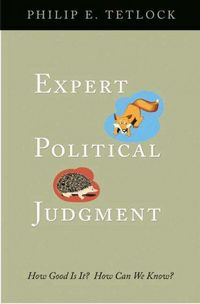

Purchase
How Good Is It? How Can We Know?
Princeton University Press
August 2006
On Sale: July 31, 2006
352 pages
ISBN: 0691128715
EAN: 9780691128719
Paperback
Add to Wish List
Non-Fiction Political
The intelligence failures surrounding the invasion of
Iraq dramatically illustrate the necessity of developing
standards for evaluating expert opinion. This book fills
that need. Here, Philip E. Tetlock explores what constitutes
good judgment in predicting future events, and looks at why
experts are often wrong in their forecasts. Tetlock
first discusses arguments about whether the world is too
complex for people to find the tools to understand political
phenomena, let alone predict the future. He evaluates
predictions from experts in different fields, comparing them
to predictions by well-informed laity or those based on
simple extrapolation from current trends. He goes on to
analyze which styles of thinking are more successful in
forecasting. Classifying thinking styles using Isaiah
Berlin's prototypes of the fox and the hedgehog, Tetlock
contends that the fox--the thinker who knows many little
things, draws from an eclectic array of traditions, and is
better able to improvise in response to changing events--is
more successful in predicting the future than the hedgehog,
who knows one big thing, toils devotedly within one
tradition, and imposes formulaic solutions on ill-defined
problems. He notes a perversely inverse relationship between
the best scientific indicators of good judgement and the
qualities that the media most prizes in pundits--the
single-minded determination required to prevail in
ideological combat. Clearly written and impeccably
researched, the book fills a huge void in the literature on
evaluating expert opinion. It will appeal across many
academic disciplines as well as to corporations seeking to
develop standards for judging expert decision-making.
Comments
No comments posted.
Registered users may leave comments.
Log in or register now!
| 


 © 2003-2024 off-the-edge.net
all rights reserved Privacy Policy
© 2003-2024 off-the-edge.net
all rights reserved Privacy Policy